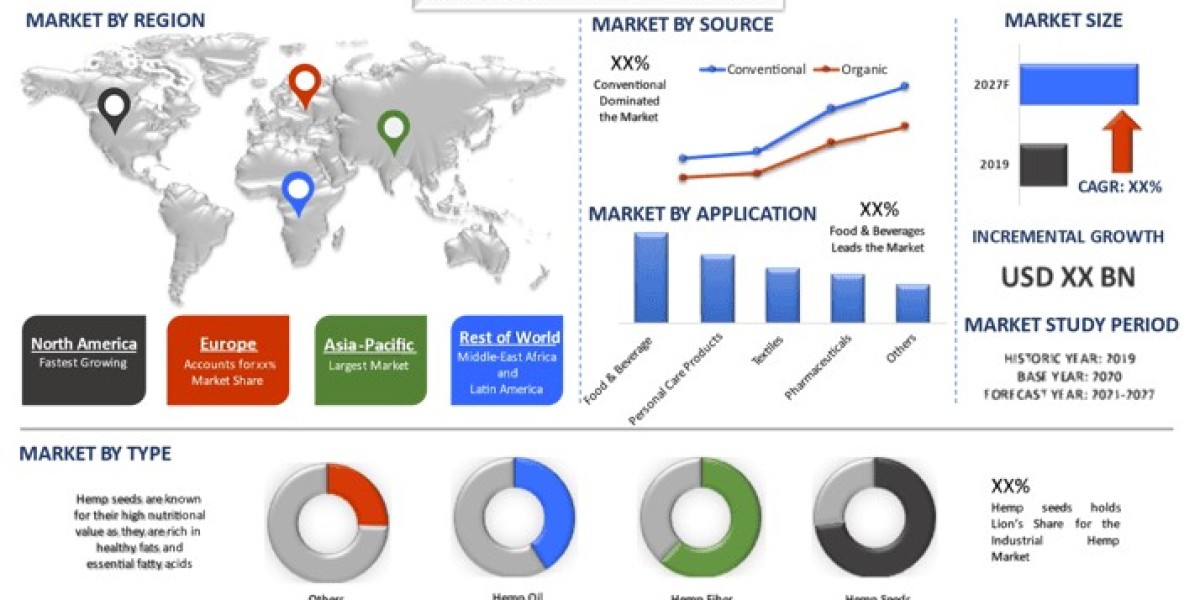Global Industrial Hemp Market was valued at US$ 5.8 billion in 2020 and is anticipated to reach US$ 30.4 billion by 2027 displaying an elevated CAGR of 27% over the forecast period 2021-2027
The global industrial hemp market is undergoing rapid growth, driven by increasing consumer awareness of its versatile applications and benefits across various industries. The market is projected to expand significantly by 2027, with a focus on hemp-based products, such as seeds, oil, and fibers, experiencing strong demand worldwide.
Market Drivers and Growth Potential
The surge in the global hemp market can be attributed to several key factors. As awareness about the health benefits of hemp rises, more consumers are turning to hemp-derived products in industries like food & beverages, personal care, pharmaceuticals, and textiles. The popularity of hemp-based CBD products, for example, saw substantial growth, with sales in the United States reaching USD 390 million in 2018. Similarly, the hemp-based food market generated USD 150 million in the same year.
Furthermore, the increasing acceptance and legalization of hemp, particularly for medicinal purposes, are fueling this growth. In regions like North America and Asia, government regulations have loosened, encouraging greater hemp cultivation and the introduction of hemp-based products into the market. The legalization of marijuana in countries like Thailand, which allowed marijuana for medical use in 2017, is a testament to the shifting global regulatory landscape.
Impact of COVID-19
The COVID-19 pandemic brought disruptions to the global economy, and the industrial hemp market was no exception. Lockdowns and supply chain interruptions led to challenges in production, manufacturing, and trade of hemp-based products. These factors caused a short-term decline in market growth, but the long-term outlook remains positive as the global economy recovers and demand for hemp continues to rise.
Access sample report (including graphs, charts, and figures): https://univdatos.com/reports/industrial-hemp-market?popup=report-enquiry
Market Segmentation
The global industrial hemp market is divided into several key segments:
- By Type: The market includes various hemp products such as hemp seeds, hemp oil, hemp fibers, and other hemp derivatives. Among these, hemp seeds and hemp oil are witnessing substantial demand, with their application in food products, health supplements, and personal care items.
- By Application: Industrial hemp finds its primary applications in food & beverages, textiles, personal care, pharmaceuticals, and more. The food & beverage sector dominates the market, largely driven by consumer shifts toward healthier, plant-based food options. Meanwhile, the personal care segment is also expected to grow as more consumers seek natural ingredients for skincare and beauty products.
- By Source: Industrial hemp is categorized into conventional and organic sources. While conventional hemp remains the dominant source in the market, organic hemp is gaining traction as consumer demand for environmentally sustainable and chemical-free products rises.
Geographical Insights
Regionally, Asia-Pacific leads the global industrial hemp market, with significant hemp cultivation in countries like China and India. In particular, China's long history of hemp cultivation supports the region’s market dominance. North America, driven by the United States and Canada, is also witnessing increased production and consumption of hemp-based goods.
Click here to view the Report Description & TOC: https://univdatos.com/reports/industrial-hemp-market
Key Market Players
Prominent companies driving growth in the industrial hemp market include Hempco, Hemp Inc., Bombay Hemp Company, Manitoba Harvest Hemp Foods, and Ecofibre. These players are focusing on product innovation, strategic partnerships, and expanding their market reach to stay competitive. They play a crucial role in addressing the growing consumer demand for hemp-based goods and in meeting the evolving regulations surrounding hemp cultivation.
Challenges and Opportunities
Despite its rapid growth, the industrial hemp market faces certain challenges, including legal and regulatory hurdles in some regions, supply chain disruptions, and market fragmentation. However, opportunities abound in emerging markets and as hemp continues to gain acceptance across different sectors, from agriculture to consumer goods.
Conclusion
The industrial hemp market is set to experience robust growth in the coming years. As more industries adopt hemp-based products and government policies become more favorable, the market will continue to expand. Companies that invest in innovation, sustainability, and market diversification will be well-positioned to lead in this burgeoning industry.
Contact Us:
UnivDatos
Email: contact@univdatos.com
Contact no: +1 978 7330253
Website: www.univdatos.com







